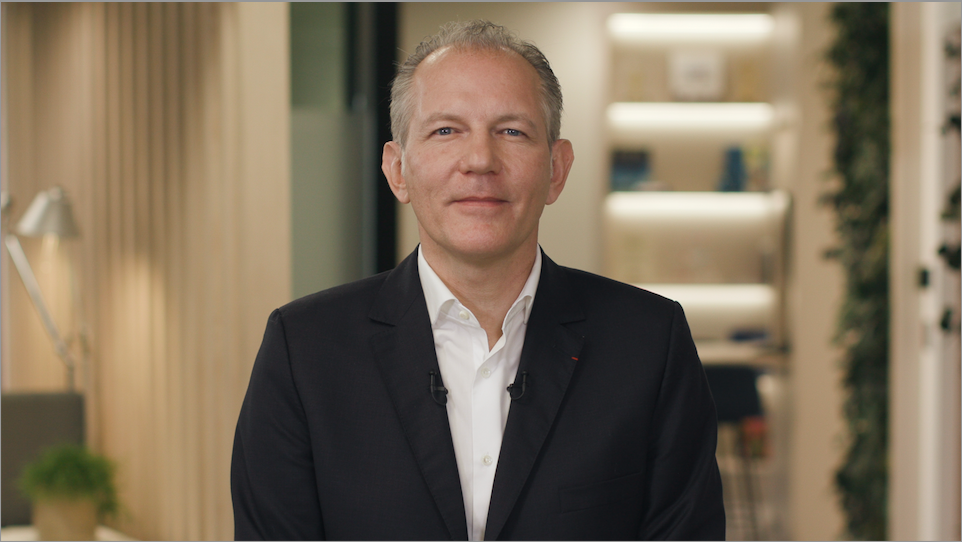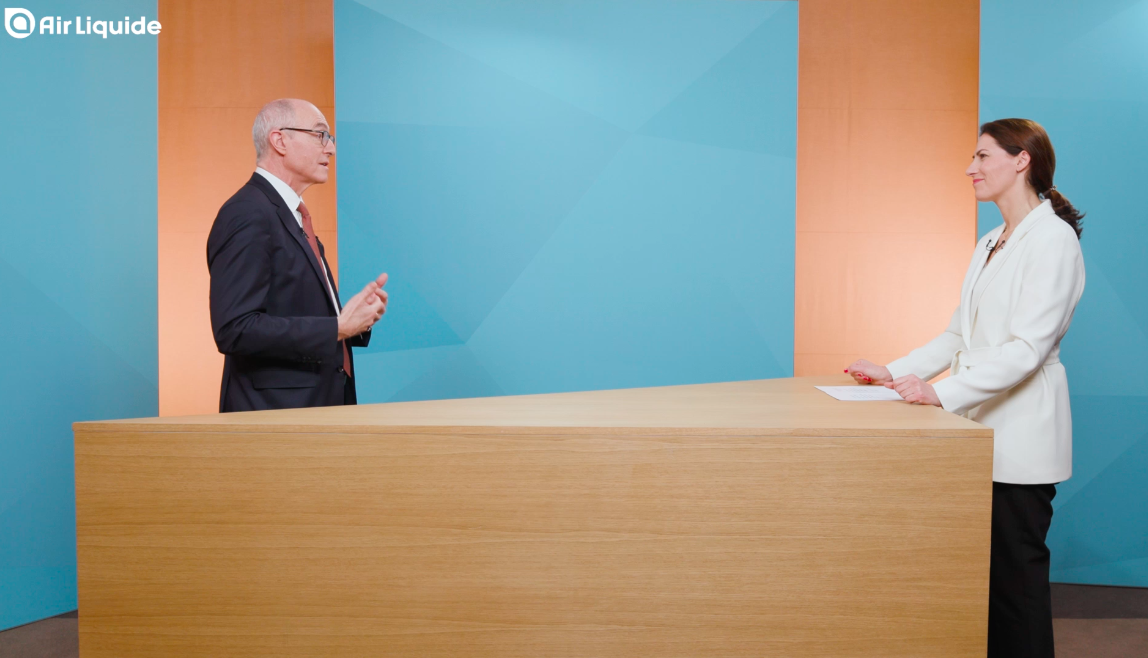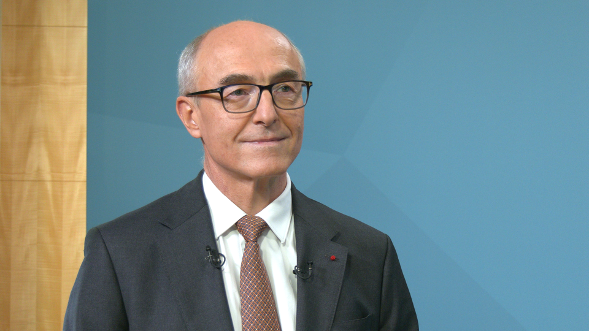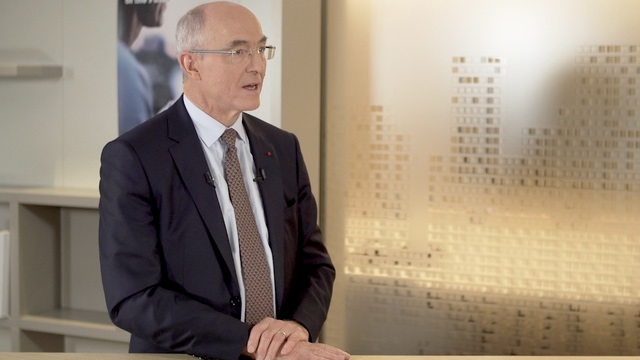EuroBusiness Media (EBM): Air Liquide, the world leader in gases for industry, health and the environment, reports results for the full-year 2011. Benoît Potier, welcome, you are the Chairman and CEO of Air Liquide. What are your comments on these results?
Benoît Potier: Well, 2011 was a solid performance in sales, in profits, and preserved very well our balance sheet. In sales first, because we had a very sustained level of activity all over the year, with the overall record level compared with the previous years. We had also a strong growth in profit, at more than 9% in the net profit growth, and the generation of cash flow together with the debt level led to a very solid balance sheet. In the fourth quarter we saw slower growth, most notably in the electronics and steel making segments, and a sort of wait-and-see attitude from some of our customers. If we look at the two years, 2010 and 2011, the Group sales grew by 10% each year, which is a very solid performance, in line with our mid-term objectives. Overall, the Group continued its growth, notably in Developing Economies, which now represent 21% of sales, compared to 15% in 2008, and which demonstrates our ability to adapt to a contrasted market environment at the very end of the year.
EBM: What are some of the key figures to bear in mind regarding your 2011 results?
Benoît Potier: First of all, the revenue was up 7.2%. The foreign exchange and the natural gas compensated each other, which means that our revenues are nearly at €15 billion in 2011. The Gas and Services (G&S) portion of those revenues, which today is nearly 90% of the sales, were up by 7.5% on a comparable basis, which is a very healthy growth in 2011. The second set of figures relate to efficiency. We posted €270 million of efficiency gains in 2011, which is above the full-year objective of €200 million. And it led us to further improve our margin ratio at 16.8%, which is a 10 basis point improvement (excluding the effect of natural gas) versus 2010. Those two elements led to a positive leverage effect in operational profit and net profit. The net profit, which was more than €1.5 billion, grew by 9.4% and it will allow us to propose a further growth of the dividend to the shareholders in May. At the end of the year, we also had 46,000 employees, which is an increase of 2,700 compared to 2010 and it will allow us to prepare the future. Finally, the further improvement of operating results demonstrates the Group’s ability to keep growing while controlling expenses.
EBM: What can you tell us about your performance in the different regions?
Benoît Potier: We had growth in all geographies in 2011. And I’ll start with Advanced Economies, where we enjoyed G&S sales growth of 5%, which is a good performance, in particular in North America where growth was 8%. I think our teams deserve a special thanks for this performance. The second part of the world is Developing Economies, where the G&S sales growth was 20%, with a split between the different regions which was rather homogenous: with 15% growth in the Americas, in particular Latin America; 24% in Europe, the eastern part of Europe, with Ukraine playing a role, and Russia, of course; and 24% in Asia Pacific, with China, of course, being one of the most dynamic and one of the strongest engines of growth for Air Liquide.
EBM: And do you have any comments about your entry into new countries?
Benoît Potier: We entered into two new countries that I’d like to mention. One is Mexico, which is at the centre of North and South America, of course, with a very interesting new Large Industries contract. And the second entry is Ukraine, where we signed an important contract in the steel industry. But entering into new markets is one thing; expanding in existing markets is also important. And we did it in Chile, in Saudi Arabia (with a further investment after the one we announced earlier last year), Russia, Turkey, and China, which remains the number 1 country in terms of growth. Finally, continued geographic development was possible thanks to winning strategic choices which are bearing fruit today.
EBM: What was the growth like across your various businesses?
Benoît Potier: Across our businesses the growth was also rather good everywhere. I’ll start with Large Industries, which posted a growth of around 12%, with the start-up of several new production units earlier in the year and new contracts related to energy and the environment. The second business line is Electronics, which also posted a growth of around 12%, which is marked by further photovoltaic contracts during 2011. The third market segment is Industrial Merchant, which showed a good resilience in contrasted markets, which also showed an increase of liquid volumes in 2011. Finally, Healthcare, which always is a very regular activity with nice growth – around 7% – driven mainly by Home Healthcare and Hygiene.
EBM: And what about the performance of your other businesses?
Benoît Potier: The other businesses went well as well. And I’d first like to mention Engineering & Construction, in particular in the fourth quarter, where we had a higher order intake. The other activities brought a solid contribution. I’m talking about Welding, which had a recovery in 2011, but also about the Chemicals (Seppic) and the Diving (Aqualung) activities, which were rather strong in the course of the year. Finally, the diversity and the strengths of our businesses were once more demonstrated during 2011.
EBM: How do these 2011 results sit with respect to your medium-term objectives under the ALMA 2015 plan?
Benoît Potier: ALMA 2015 is made of four components. One is sales Growth. The second is Efficiency. The third is Return on capital employed (ROCE) and the fourth is our Responsibility. Let’s take each of them. First, the sales. We’ve shown that we were able to accelerate group sales by two points if we compare it with the 2005-2008 period. On top of that, 2011 was a year where we decided investment up to €2 billion, which will allow us to feed the growth in the future. I’d like to say that 60% of that figure is in Developing Economies, which shows how the mix of the Group will evolve in the future. The second point is Efficiencies. We have an on-going process of improving efficiency and 2011 showed gains of €270 million, which is above the full-year objective. The third point is the ROCE, which at the end of 2011 was 12.1%, in line with the ALMA objective which was a range between 12% and 13%. And finally, the Corporate Social Responsibility (CSR) approach was implemented in 2011, where we prepared the deployment of this program in the Group and we will, in 2012, introduce new indicators to measure the Corporate Social Responsibility. Finally, 2011 illustrates not only the solid progress of our ALMA 2015 program, but also the commitment of the teams to achieve those objectives in the future.
EBM: What is your outlook for 2012 given the current economic environment? And what is your degree of confidence in your medium-term outlook?
Benoît Potier: A starting point to assess 2012 is the context that we had in 2011. We had a solid performance, both in sales and profit in an unsettled environment, specifically at the end of the year. We were also in line with ALMA 2015 objectives. The second point is that we confirmed both the investment momentum and our market trends, which is good confidence for the future. So all in all, and barring a major economic downturn, we aim for growth in net profit in 2012.
EBM: And what is your degree of confidence in your medium-term outlook?
Benoît Potier: Our medium-term outlook is first a matter of investment. The portfolio of opportunity, the 12-month portfolio, is at €4.2 billion, which is higher than in the end of 2010. In 2011, we also decided up to €2 billion of new investments which will feed the growth in the coming years. The second thing I’d like to say is the fact that our growth is not limited to GDP. Actually, we have site takeovers, for instance; the ability to move the borders to extend our markets with further initiatives, like in the Electronics segment, fluorine; diabetes in medical sector; the gasification of coal or other oil-related products in Large Industries; and also hydrogen-energy or gaseous drugs. The long-term trends have been reconfirmed and they are all at the heart of the 21st century. The third point is the solid balance sheet and our ability to integrate the efficiency program in our global world DNA. I think it is important for the future, as well as our ability to adapt in a contrasted environment, thanks to tight and motivated teams. All in all, that allows the Group to strengthen its position in growth markets and to be confident in its mid-term outlook.
EBM: Benoît Potier, Chairman and CEO of Air Liquide, thank you very much.
Benoît Potier: Thank you.





